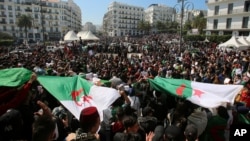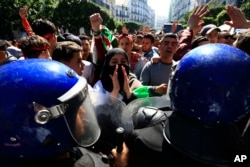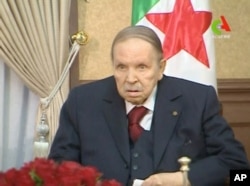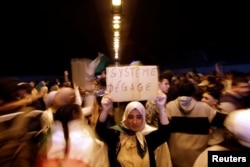For a country that has long banked on stability, Algeria is now buffeted by serious winds of change, with massive protests morphing into the biggest challenge facing its aging government in nearly three decades.
Monday marked the biggest jolt, when 82-year-old President Abdelaziz Bouteflika renounced a fifth presidential term, reshuffled his government, proclaimed the drafting of a new constitution and rescheduled presidential elections initially set for April to an unspecified date.
But who ultimately wins the contest between the street and Algeria’s entrenched power system remains a big unknown. Will the North African country’s majority-young population realize hopes for a political sea change? Or will the country’s ruling National Liberation Front (FLN) Party, in power since Algerian independence, prevail?
“We were waiting for the Algerian power to find a ruse to stay in place,” said North Africa analyst Khadija Mohsen-Finan of the French Institute for International and Strategic Affairs, suggesting this is exactly what happened. Bouteflika’s announcements, she added, would essentially extend his term in office indefinitely, “in contempt of the constitution and people’s demands for change.”
Algeria’s government insists otherwise.
“I believe it profoundly,” replied Algeria’s newly named vice prime minister, Ramtane Lamamra, who some speculate might succeed Bouteflika as president, when asked whether his country was marking a turning point.
“It’s up to the women, men and especially the young to shoulder this historic responsibility,” Lamamra added in an interview with Radio France International.
Back on the streets
After initial celebrations following Bouteflika’s concessions, Algerians were back on the streets Tuesday, underscoring that they, too, were skeptical of the government’s apparent U-turn.
Several thousand students protested in the capital, Algiers, and elsewhere in the country, brandishing banners against an extension of the president’s fourth term. More demonstrations involving a broader swath of the population are scheduled Thursday and Friday, in what might amount to a key test of whether the protest movement will prevail.
“It’s a mixed victory for Algerians,” wrote Algeria’s leading independent newspaper, El Watan. Nonetheless, it added, change was afoot, with “the population as central actor.”
Ali Benflis, a former Algerian prime minister turned opposition leader, offered a similar analysis.
“We’re living in a paradox,” he said in remarks on French radio, “with pyromaniacs on the one hand, ready to set the country on fire to ensure the survival of a condemned regime. On the other, a population that has decided to take charge of its destiny.”
For its part, former colonial power France has exited from near silence about the protests to cautiously endorse the latest developments.
In remarks from Djibouti, President Emmanuel Macron welcomed Bouteflika’s announcements as starting “a new page in the development of Algeria's democracy," even as he called for a “reasonable time frame” for a transition period.
Damaged reputation
Bouteflika was hailed as a savior when he assumed office in 1999, at the end of Algeria’s brutal civil war. He was an old face — a veteran of the country’s war of independence from France who became foreign minister at the age of 26.
As the country’s first civilian president, Bouteflika was initially credited for putting reconciliation at the center of his agenda. He controversially offered amnesty to Islamist fighters not involved in major atrocities in the 1990s conflict. But other war-related questions remained unanswered, including mass disappearances for which some blamed both the Islamists and Algeria’s military.
Many critics also accuse Bouteflika and what Algerians term ‘le Pouvoir’ — referring to a shadowy clique of elites — for nurturing endemic corruption.
“It’s billions and billions,” Benflis said. “Major projects that are often unrealized or badly done and the beneficiaries are always four or five people in the president’s entourage.”
More recently, Bouteflika and his government have seen key pillars of support vanish, from influential unions to business leaders. In a speech to military academy students Sunday, the chief of staff for Algeria’s armed forces, Gen. Ahmed Gaid Salah, said the army shared “the same values and principles” as the people.
“What gave the Algerian political system force was that it appeared to speak with a single voice and have the same objectives,” said analyst Mohsen Finan. “Today, not only does it not speak with a single voice, but key institutions that gave it legitimacy are moving away from it.”
What’s next?
Turning the page — if it happens — is unlikely to be easy. Algeria largely stayed on the sidelines of Arab Spring political revolts that hopscotched across North Africa and the Middle East. Each carried its own stamp, Mohsen-Finan said, and what happens to Algeria will be no different.
“I think Algeria has drawn lessons from what’s happened elsewhere,” she said, adding the population has no appetite for revisiting its bloody past.
“What’s most important today is the Algerian street massively wants change,” Mohsen-Finan added. “Not just at the head, but the whole system rebuilt by a new generation.”
Reuters news agency reported veteran Algerian diplomat Lakhdar Brahimi, an aging but respected figure, would lead discussions over Algeria's future in the coming months, which would also involve members of the protest movement.
Meanwhile, French-Algerian researcher Amel Boubekeur said the next challenge will be turning a popular uprising into a formal, political force. Like the government, many of Algeria’s traditional opposition parties are largely discredited by the public.
Still, a fundamental political shift will take time, Boubekeur told France’s Le Monde newspaper, and demand negotiations between protesters and the government.
“It means inventing our own transition model,” she said, adding, “it’s too early to say what it will be.”







